Role of MPs in tackling climate change

I had an opportunity to address a meeting of Bangladeshi parliamentarians, under the leadership of Speaker of the House Dr Shirin Sharmin Chaudhury, organised by the UNDP, on the outcome of COP27 and the role of parliamentarians going forward.
Let me share some of my remarks to the parliamentarians and also some of the outcomes of the event.
The main positive outcome of COP27, held in November 2022 in Egypt, was the agreement to set up a funding mechanism to address loss and damage from human-induced climate change. This was a major breakthrough agreement and the result of some very effective advocacy and diplomacy by Bangladesh as part of the climate-vulnerable developing countries' group.
The activities of the Transitional Committee on funding loss and damage need to be geared up to get a result in COP28, which is scheduled to be held in December 2023 in Dubai. We must keep a close eye on the work of the Transitional Committee before COP28.
Regarding the role of parliamentarians, there are three levels of action they could get involved in – namely the global, national, and local levels.
Bangladeshi parliamentarians have already been playing a leading role for a number of years. MP Saber Hossain Chowdhury, who have chaired the Inter-Parliamentary Union (IPU) for many years, and Dr Shirin Sharmin Chaudhury, who have chaired the Commonwealth Parliamentary Association (CPA), both raised the issue of tackling climate change from their respective positions. More recently, under the presidency of Prime Minister Sheikh Hasina, the Climate Vulnerable Forum (CVF) also set up a new parliamentarian forum, in which all our parliamentarians should join and participate in their deliberations and global advocacy, together with their counterparts from other vulnerable developing countries.
At the national level, the parliamentarians – as part of their membership of the different parliamentary standing committees – have a constitutionally mandated role of overseeing the activities of different ministries of the government and need to sharpen their role in monitoring their activities in tackling climate change, especially the allocation and disbursement of the climate budget under the Ministry of Finance. The climate budget has been an excellent initiative of the finance ministry. But merely announcing the budget allocations without providing information on the actual expenditures will not ensure their usefulness. Hence, the Parliamentary Standing Committee on Finance must take a greater responsibility to oversee the climate budget allocation, as well as expenditures, as they are constitutionally mandated to do.
The third level of activities of parliamentarians was vividly illustrated in real time as we met just as Cyclone Mocha was approaching Bangladesh (before moving on to Myanmar). The cyclone preparedness programme of Bangladesh – which involves everyone from scientists, who track the cyclones, to government agencies responsible for preparation to volunteers letting everyone know about the coming event and helping them get to the shelters – was particularly pertinent as every parliamentarian in the meeting had considerable experience to share on tackling cyclones and other weather-related disasters.
All parliamentarians in Bangladesh, and indeed globally, need to become aware of climate change and about their specific roles in helping their constituents tackle its impacts through effective local adaptation. However, the MPs rightly pointed out that every constituency is different with respect to which climate change impacts need more attention and what they need to do to prepare themselves. Hence, a constituency-by-constituency set of data and information could be developed by the government and experts.
At the same time, a set of parliamentarians from the most vulnerable constituencies could form a special group to get more deeply involved regarding the climate actions needed at the local level in their constituencies.
Finally, I recommended that the Parliamentary Standing Committee on Environment and Climate Change take the lead in learning more about and then implementing the Mujib Climate Prosperity Plan (MCPP), along with the National Adaptation Plan (NAP) and the Bangladesh Delta Plan. I am pleased that the speaker endorsed this recommendation and asked the UNDP to follow up on it.
It is now clear that every group of citizens in Bangladesh must learn about their respective roles in tackling climate change and then carry out their tasks urgently and at scale. I was pleased to see that our parliamentarians seem to have gotten the message and have taken up their role in earnest, and I am happy to help them in any way I can from hereon.
Dr Saleemul Huq is director of the International Centre for Climate Change and Development (ICCCAD) and professor at Independent University, Bangladesh (IUB).

 For all latest news, follow The Daily Star's Google News channel.
For all latest news, follow The Daily Star's Google News channel. 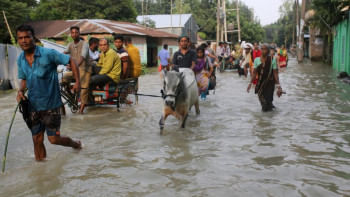
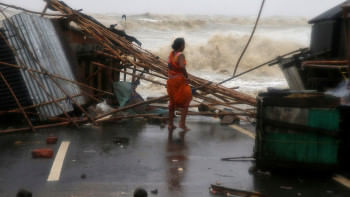

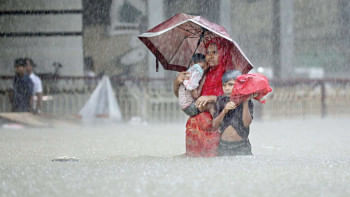
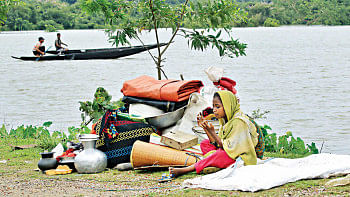


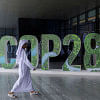
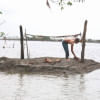

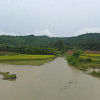
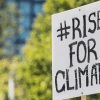


Comments